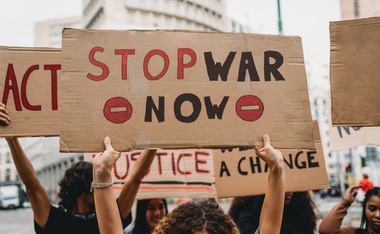The views expressed in our content reflect individual perspectives and do not represent the authoritative views of the Baha'i Faith.
With the terrible wars now raging in the world — in Sudan, in Ukraine, in the Middle East, and many other regions — is it even possible to talk about war and peace these days? Or has a sense of hopelessness and powerlessness taken over?
How can we talk about the prospect of peace in such brutal, bloody, warlike times?
In fact, it has become more and more difficult to even imagine or discuss the possibility of a peaceful world, especially against the backdrop of complex, competing, and controversial political and economic interests. In such times, who determines the validity of freedom of speech, international law, and human rights? Do sovereign nations have the absolute right to wage war whenever they want?
RELATED: How to Really Talk – and Do Something – About War and Peace
Ironically, the statement attributed to Aeschylus, “In war, truth is the first casualty,” likely holds true here again.
Isn’t it disheartening that humanity, after two catastrophic world wars in the past century, finds itself in a seemingly unending series of further regional wars, increasing the danger of a new global conflagration? After all, the underlying dynamic behind the emergence of war has changed little: territorial and power claims legitimized by prejudices, often deliberately reinforced by those in power, and then converted directly into death and destruction. The Baha’i teachings describe that all-too-familiar pattern this way:
… war is destruction while universal peace is construction; war is death while peace is life; war is rapacity and bloodthirstiness while peace is beneficence and humaneness; war is an appurtenance of the world of nature while peace is of the foundation of the religion of God; war is darkness upon darkness while peace is heavenly light; war is the destroyer of the edifice of mankind while peace is the everlasting life of the world of humanity; war is like a devouring wolf while peace is like the angels of heaven; war is the struggle for existence while peace is mutual aid and cooperation among the peoples of the world …
These wars all come with their frightful cargo of unbearable human suffering and severe geopolitical repercussions. The war against Ukraine has already had far-reaching consequences on a global scale — well beyond the huge losses of life in the directly-affected countries — with significant social and economic implications in places like Africa and South America. Wars like these dramatically intensify hunger, poverty, medical emergencies, and the polarization of entire societies within the global commons, not to mention the irreversible effects on climate change due to weapons production and use.
So we cannot hide our heads in the sand and ignore these wars — we’re compelled, because we’re all connected to one human family, to bring them up in our discussions, see if we can determine the truth about the causes of such conflicts, and find solutions.
RELATED: Avoiding the Apocalypse, and Finding The Road Forward—Together
All of this leads me, as an individual Baha’i interested in discourse on pressing societal issues, to try to engage in more discussions about war and peace, not less. I’m convinced that ignoring these wars will worsen them. We can no longer be in denial, or ignore the reality of war because it doesn’t take place directly on our doorsteps. I don’t want to presume to judge specific solutions, but if you’d like to join me in speaking out about such wars, some thoughts seem essential as a prerequisite for discussion, whether in personal or broader contexts such as interreligious dialogue.
Most of us would agree with the reasonable idea that a concrete, comprehensive, secure world peace paves the way for a secure and prosperous future. The Swiss writer Friedrich Dürrenmatt, known for his apocalyptic drama “The Physicists,” where he theatrically explored the possibility of humanity’s destruction by a secret bomb, cautioned: “One must never cease to imagine the world as it would be most reasonable.”
So, before we hastily form opinions about newly emerging wars, we should first inform ourselves about their background and history. Only then does the debate appear in an appropriate light because the connections are, in reality, much more complex and complicated than what the media images and assessments reveal. Images and assessments primarily evoke feelings, but they do not necessarily aid in understanding; sometimes, they can even hinder it. In my view, future perspectives must be conceived mainly in a manner that is “most reasonable.”
Surely, these are not easy discussions. But when we fail to talk about these wars, does that mean our freedom of speech is under threat? Even in the art world, which thrives on freedom, a dispute is now arising about what can still be said and thought. The same applies to interreligious dialogue. People with different opinions are publicly pressured to make unequivocal “confessions” in clear, unambiguous words. No “yes, but …” because that supposedly always contains doubt about what others consider unequivocal based on facts.
However, I believe that a distinction should be made in this debate: between, on the one hand, established facts that leave no room for doubt and, on the other hand, the effort towards truth-finding, understanding underlying causes, and discovering possible solutions. This process always begins with a variety of different opinions that must also be heard and tolerated — even if that is difficult.
That’s the first line of defense against war — the truth.
An earlier version of this article first appeared in German here: https://www.perspektivenwechsel-blog.de/bahai-artikel/krieg-und-frieden
You May Also Like
Comments

















Excellent article: A suggestion: Could we follow it up with exploring the points indicated above, such as established facts, an effort in writing that leads to truth-finding, understanding possible causes, and an attempt in discovering possible solutions? I am sure the youth of today would be happy and capable to take up this challenge and enlighten us with their innovative ideas to answer some of these.